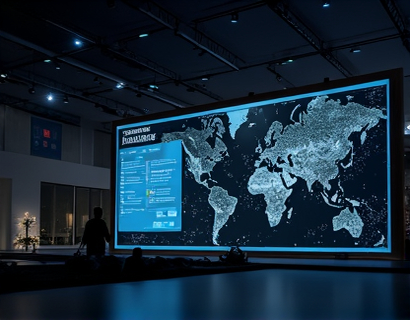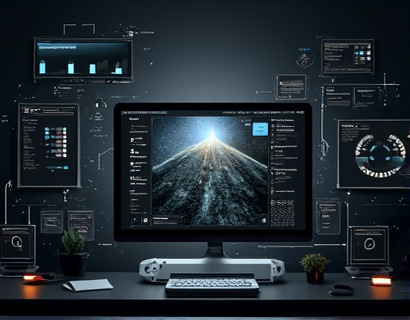AI-Powered Market Insights: Transforming Decision Making with Intelligent Chat Technology
In today's fast-paced business environment, the ability to make swift and informed decisions is crucial for success. The integration of artificial intelligence (AI) into market insights has emerged as a game-changer, offering businesses a powerful tool to navigate the complexities of market services and industry trends. This article delves into how an AI-powered chat interface can revolutionize market strategy by providing real-time, actionable insights, thereby empowering business leaders and analysts to stay ahead in a rapidly changing landscape.
The Need for Real-Time Market Insights
The modern market is characterized by constant flux, with trends emerging and evolving at an unprecedented pace. Traditional methods of gathering market intelligence, such as manual research and periodic reports, often fall short in providing the timely data necessary for effective decision-making. This is where AI-powered chat technology comes into play, offering a dynamic solution that can adapt to the ever-changing market conditions.
Real-time insights are vital for businesses to respond quickly to market shifts, capitalize on new opportunities, and mitigate risks. An AI chat interface can continuously monitor various data sources, including social media, news feeds, and industry reports, to deliver up-to-the-minute information directly to users. This immediacy ensures that decision-makers have access to the most current data, enabling them to make informed choices without delay.
Enhancing Decision-Making with AI Chat Technology
The core advantage of an AI chat interface lies in its ability to transform raw data into actionable insights. By leveraging advanced natural language processing (NLP) and machine learning algorithms, the chat system can understand complex queries and provide precise, relevant responses. This capability is particularly valuable for business leaders and analysts who need to sift through vast amounts of information to identify key trends and patterns.
For instance, a business leader might ask the chat interface about the current state of the e-commerce market. The AI would analyze real-time data from multiple sources, such as sales figures, consumer behavior, and competitor activities, to provide a comprehensive overview. This includes identifying growth areas, potential challenges, and strategic recommendations, all within a matter of seconds.
Key Features of AI-Powered Market Insights
- Real-Time Data Analysis: Continuously monitors and analyzes data from various sources to provide up-to-date insights.
- Natural Language Processing: Understands and responds to complex queries in natural language, making it user-friendly and accessible.
- Predictive Analytics: Uses historical data and machine learning to forecast future trends and market movements.
- Customizable Dashboards: Allows users to tailor the interface to their specific needs, focusing on the most relevant metrics and indicators.
- Integration Capabilities: Seamlessly integrates with existing business intelligence tools and platforms, enhancing overall functionality.
These features collectively enhance the decision-making process by providing a holistic view of the market. Users can quickly identify opportunities and threats, adjust strategies on the fly, and stay one step ahead of the competition.
Empowering Business Leaders and Analysts
Business leaders and analysts are the driving forces behind strategic decision-making. However, the sheer volume of data available can be overwhelming, leading to analysis paralysis. An AI chat interface simplifies this process by acting as a personal assistant, filtering and presenting information in a digestible format.
For example, a marketing analyst might use the chat to explore consumer sentiment towards a new product launch. The AI would aggregate data from social media platforms, review sites, and market surveys to provide a sentiment analysis. This analysis could highlight positive and negative feedback, key influencers, and emerging trends, all of which are crucial for refining marketing strategies.
Moreover, the chat interface can handle multiple queries simultaneously, saving time and reducing the workload on human analysts. This efficiency allows teams to focus on higher-level strategic tasks, knowing that the AI is handling the data-intensive aspects of market research.
Enhancing Collaboration and Communication
The AI chat interface not only provides individual insights but also fosters better collaboration within teams. In a business setting, stakeholders often come from diverse backgrounds and may have different levels of market knowledge. The chat can serve as a common platform where team members can ask questions, share findings, and discuss strategies in real time.
For instance, during a strategic planning session, a product manager might ask the chat for the latest competitor analysis while a sales representative inquires about regional market trends. The AI can provide synchronized responses, ensuring that all team members are aligned and informed. This real-time sharing of insights promotes a more cohesive and effective decision-making process.
Ensuring Security and Reliability
In an era where data security is paramount, an AI-powered chat interface must prioritize the protection of sensitive information. Secure data transmission, robust authentication mechanisms, and compliance with industry standards are essential components of the platform. Users can have confidence that their data is safe and that the insights provided are based on accurate and reliable sources.
Additionally, the chat system is designed to be resilient against potential threats such as data breaches and cyber attacks. Regular security audits and updates ensure that the platform remains secure and up-to-date with the latest cybersecurity measures.
User Experience and Accessibility
The success of an AI chat interface depends significantly on its user experience (UX). A well-designed interface should be intuitive, responsive, and easy to navigate. Users should be able to interact with the chat using natural language, without the need for technical expertise.
Accessibility is another critical aspect. The chat interface should be accessible on various devices, including desktops, tablets, and smartphones, ensuring that users can access market insights anytime and anywhere. This flexibility is particularly important for business professionals who need to stay informed on the go.
Case Studies and Real-World Applications
To better understand the practical benefits of AI-powered market insights, let's explore a few real-world applications across different industries.
E-Commerce
An e-commerce company can use the chat interface to monitor real-time consumer behavior and preferences. By analyzing data from online reviews, social media, and browsing patterns, the AI can provide insights into trending products, customer pain points, and effective marketing channels. This information helps the company optimize its product offerings, enhance customer experience, and refine its marketing strategies.
Finance
In the finance sector, market volatility and regulatory changes require constant vigilance. An AI chat interface can provide real-time updates on market trends, economic indicators, and regulatory news. For instance, a portfolio manager can use the chat to get instant analysis of how a recent policy change might impact investment strategies, allowing for timely adjustments to mitigate risks.
Manufacturing
For manufacturers, supply chain disruptions and raw material price fluctuations can significantly impact operations. The chat interface can monitor global supply chain data and commodity prices, offering insights into potential bottlenecks and cost-saving opportunities. This proactive approach enables manufacturers to make informed decisions that enhance efficiency and reduce costs.
Future Trends and Innovations
The integration of AI into market insights is just the beginning. As technology continues to evolve, we can expect even more sophisticated capabilities. One promising area is the incorporation of augmented reality (AR) and virtual reality (VR) to provide immersive data visualizations. Users could interact with 3D models of market landscapes, gaining deeper insights through visual and spatial understanding.
Another trend is the use of explainable AI (XAI), which aims to make AI decisions more transparent and understandable to humans. This is particularly important in high-stakes decision-making environments where users need to trust and validate the insights provided by the AI.
Furthermore, the integration of AI with the Internet of Things (IoT) can lead to more granular and real-time data collection. IoT devices can feed live data into the AI system, enhancing the accuracy and relevance of market insights.
Conclusion
The advent of AI-powered market insights represents a significant leap forward in how businesses navigate the complexities of the modern market. By providing real-time, actionable insights through an intuitive chat interface, this technology empowers business leaders and analysts to make informed, swift decisions. As the platform continues to evolve, it will likely become an indispensable tool for any organization looking to stay competitive and agile in a rapidly changing world.











































